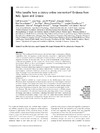Identificador persistente para citar o vincular este elemento:
https://accedacris.ulpgc.es/jspui/handle/10553/36064
| Título: | Who benefits from a dietary online intervention? Evidence from Italy, Spain and Greece | Autores/as: | Schwarzer, Ralf Fleig, Lena Warner, Lisa M. Gholami, Maryam Serra-Majem, Lluis Ngo, Joy Roman Viñas, Blanca Ribas-Barba, Lourdes Distante, Alessandro Ntzani, Evangelia Giannakis, George Brandi, Maria L. |
Clasificación UNESCO: | 3206 Ciencias de la nutrición | Palabras clave: | Dietary change Digital intervention Action planning Action control Outcome expectancies, et al. |
Fecha de publicación: | 2017 | Publicación seriada: | Public Health Nutrition | Resumen: | Objective: The traditional Mediterranean diet includes high consumption of fruits, vegetables, olive oil, legumes, cereals and nuts, moderate to high intake of fish and dairy products, and low consumption of meat products. Intervention effects to improve adoption of this diet may vary in terms of individuals' motivational or volitional prerequisites. In the context of a three-country research collaboration, intervention effects on these psychological constructs for increasing adoption of the Mediterranean diet were examined. Design: An intervention was conducted to improve Mediterranean diet consumption with a two-month follow-up. Linear multiple-level models examined which psychological constructs (outcome expectancies, planning, action control and stage of change) were associated with changes in diet scores. Setting: Web-based intervention in Italy, Spain and Greece. Subjects: Adults (n 454; mean age 422 (sd 104) years, range 18-65 years; n 112 at follow-up). Results: Analyses yielded an overall increase in the Mediterranean diet scores. Moreover, there were interactions between time and all four psychological constructs on these changes. Participants with lower levels of baseline outcome expectancies, planning, action control and stage of change were found to show steeper slopes, thus greater behavioural adoption, than those who started out with higher levels. Conclusions: The intervention produced overall improvements in Mediterranean diet consumption, with outcome expectancies, planning, action control and stage of change operating as moderators, indicating that those with lower motivational or volitional prerequisites gained more from the online intervention. Individual differences in participants' readiness for change need to be taken into account to gauge who would benefit most from the given treatment. | URI: | https://accedacris.ulpgc.es/handle/10553/36064 | ISSN: | 1368-9800 | DOI: | 10.1017/S1368980016002913 | Fuente: | Public Health Nutrition [ISSN 1368-9800], v. 20 (5), p. 938-947 |
| Colección: | Artículos |
Citas SCOPUSTM
14
actualizado el 08-jun-2025
Citas de WEB OF SCIENCETM
Citations
12
actualizado el 25-ene-2026
Visitas 10
192
actualizado el 01-nov-2024
Descargas
201
actualizado el 01-nov-2024
Google ScholarTM
Verifica
Altmetric
Comparte
Exporta metadatos
Los elementos en ULPGC accedaCRIS están protegidos por derechos de autor con todos los derechos reservados, a menos que se indique lo contrario.
